|
|
|
Sort Order |
|
|
|
Items / Page
|
|
|
|
|
|
|
| Srl | Item |
| 1 |
ID:
116858
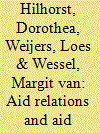

|
|
|
|
|
| Publication |
2012.
|
| Summary/Abstract |
This paper considers mutual imaging of aid workers and Bhutanese refugees in Nepal. Based on a theoretical perspective of aid as a socially negotiated arena, the contextual and interactionist concept of imaging is used, rather than labelling (which is done to people), or perceptions (located in one actor's head). The paper uses a Q-methodology that symmetrically researches different groups of actors by posing the same questions. Our data confirm that the distinctions between the way aid workers and recipients view themselves, each other and the aid provided were more gradual than clear-cut between categories and that the legitimacy of aid workers is not determined by the perceived quality of aid. Problems with routinised aid were not translated into negative images, whereas problems with new and irregular types of aid were. Our research indicates the importance of the interaction between implementing staff and active beneficiaries. The roles of these active volunteers and incentive workers are important but ambiguous. They may smooth the divide between aid agencies and clients, but their proximity to the aid regime may also lead to tensions. The way these roles are played out and the effect this has on imaging and aid legitimacy is an area for further research.
|
|
|
|
|
|
|
|
|
|
|
|
|
|
|
|
| 2 |
ID:
153691
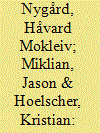

|
|
|
|
|
| Summary/Abstract |
What factors explain attacks on humanitarian aid workers? Most research has tended to describe trends rather than analyse the underlying reasons behind attacks. To move this agenda forward, we present to our knowledge the first peer-reviewed cross-national time-series study that identifies factors related to violent attacks on humanitarian aid workers. Our theoretical framework explores two sets of potential explanatory factors: dynamics of conflicts; and the politicization and militarization of humanitarian operations. Using a global sample at the country level from 1997 to 2014, our results suggest that: (i) the presence and severity of armed conflicts are related to increased attacks on aid workers; (ii) aid workers do not appear to face greater risks even where civilians are targeted; (iii) the presence of an international military force does not appear to add to nor decrease risks to aid workers; and (iv) the effects of peacekeeping operations upon humanitarian security are varied. We discuss this in light of the ongoing challenges facing humanitarian organizations to provide security in fragile and conflict-affected areas.
|
|
|
|
|
|
|
|
|
|
|
|
|
|
|
|
| 3 |
ID:
155718
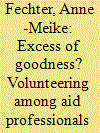

|
|
|
|
|
| Summary/Abstract |
This article explores the meaning of volunteering among professional aid workers. While they experience disenchantment in their daytime work, volunteering provides them with benefits lacking in their paid jobs. At the same time, a compensatory model does not capture the complex dimensions of this relationship. One motive behind their professional work – bringing about positive change for others – is also the driving force behind their voluntary practices. Such excess of doing good may be indicative of their overall commitment. If aid workers make sense of their actions within a framework of alienated labour, rendering their waged aid work as a commodity, volunteering emerges as a remedial response. At the same time, their paid and unpaid work is animated by the impulse of giving. Such co-existence implies that gifts and commodities are not mutually exclusive; or indeed that both can be understood, following Parry (1986), as emerging from a highly developed capitalist system.
|
|
|
|
|
|
|
|
|
|
|
|
|
|
|
|
| 4 |
ID:
123529
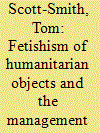

|
|
|
|
|
| Publication |
2013.
|
| Summary/Abstract |
This paper examines two common objects in humanitarian assistance: a therapeutic food called Plumpy'nut, and a tape for measuring malnutrition known as the muac band. It argues that humanitarian relief has become a standardised package reliant on such objects, which receive excessive commitment from aid workers and are ascribed with almost magical powers. Drawing on the Marxist notion of commodity fetishism, the paper proposes a three-part model for examining this phenomenon, in which humanitarian objects are bound up in processes of concealment, transformation and mystification. First, these objects are perceived as rootless, recent discoveries, allowing the complex history and ambivalent results of technology to be concealed. Second, they facilitate a single-minded attention to efficiency and aggregate survival, which transforms the way humanitarian action is understood. Third, these objects are imbued with a mystical and autonomous spirit, redefined as irreplaceable elements of aid. This 'fetishism of humanitarian objects', the paper concludes, prevents a more flexible and people-centred approach to relief.
|
|
|
|
|
|
|
|
|
|
|
|
|
|
|
|
| 5 |
ID:
157943
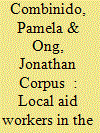

|
|
|
|
|
| Summary/Abstract |
This paper examines the experiences of Filipino workers recruited for technology and communications work by international aid agencies involved in the Typhoon Haiyan response. Filipino workers, many of whom were personally coping with the social and economic impact of this disaster, were hired on short-term contracts to test and implement various digital humanitarian innovations such as feedback and hazard mapping technological platforms. These workers were doubly marginalized: first, as tech workers whose work was viewed by aid officers on the ground as less substantial than that of food or shelter programs; and second, as local voices often drowned out by national and international colleagues. Moving beyond the usual figure of the cosmopolitan and adventure-seeking Western humanitarian acting on distant suffering, this paper draws attention to local aid workers’ aspirations for personal and professional mobility as they seize novel opportunities opened up by the digital humanitarian agenda. It outlines how the digital humanitarian project’s ambition to facilitate the inclusion of disaster-affected communities is fundamentally undermined by labor arrangements that doubly marginalize local aid workers.
|
|
|
|
|
|
|
|
|
|
|
|
|
|
|
|
|
|
|
|
|